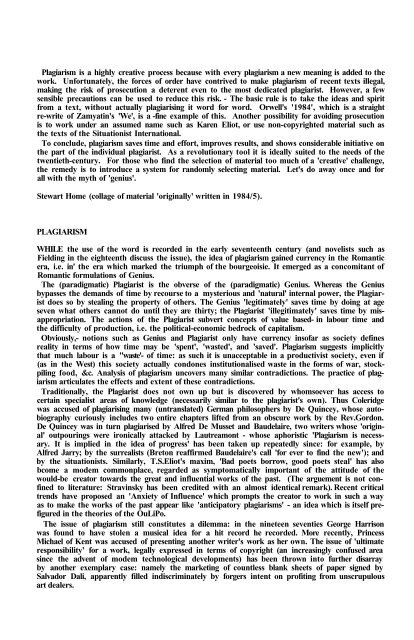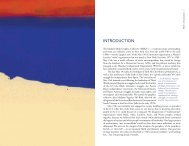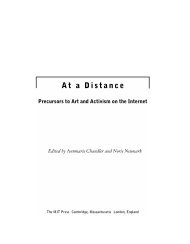Plagiarism: Art As Commodity and Strategies for ... - El plagio literario
Plagiarism: Art As Commodity and Strategies for ... - El plagio literario
Plagiarism: Art As Commodity and Strategies for ... - El plagio literario
Create successful ePaper yourself
Turn your PDF publications into a flip-book with our unique Google optimized e-Paper software.
<strong>Plagiarism</strong> is a highly creative process because with every plagiarism a new meaning is added to the<br />
work. Un<strong>for</strong>tunately, the <strong>for</strong>ces of order have contrived to make plagiarism of recent texts illegal,<br />
making the risk of prosecution a deterent even to the most dedicated plagiarist. However, a few<br />
sensible precautions can be used to reduce this risk. - The basic rule is to take the ideas <strong>and</strong> spirit<br />
from a text, without actually plagiarising it word <strong>for</strong> word. Orwell's '1984', which is a straight<br />
re-write of Zamyatin's 'We', is a -fine example of this. Another possibility <strong>for</strong> avoiding prosecution<br />
is to work under an assumed name such as Karen <strong>El</strong>iot, or use non-copyrighted material such as<br />
the texts of the Situationist International.<br />
To conclude, plagiarism saves time <strong>and</strong> ef<strong>for</strong>t, improves results, <strong>and</strong> shows considerable initiative on<br />
the part of the individual plagiarist. <strong>As</strong> a revolutionary tool it is ideally suited to the needs of the<br />
twentieth-century. For those who find the selection of material too much of a 'creative' challenge,<br />
the remedy is to introduce a system <strong>for</strong> r<strong>and</strong>omly selecting material. Let's do away once <strong>and</strong> <strong>for</strong><br />
all with the myth of 'genius'.<br />
Stewart Home (collage of material 'originally' written in 1984/5).<br />
PLAGIARISM<br />
WHILE the use of the word is recorded in the early seventeenth century (<strong>and</strong> novelists such as<br />
Fielding in the eighteenth discuss the issue), the idea of plagiarism gained currency in the Romantic<br />
era, i.e. in' the era which marked the triumph of the bourgeoisie. It emerged as a concomitant of<br />
Romantic <strong>for</strong>mulations of Genius.<br />
The (paradigmatic) Plagiarist is the obverse of the (paradigmatic) Genius. Whereas the Genius<br />
bypasses the dem<strong>and</strong>s of time by recourse to a mysterious <strong>and</strong> 'natural' internal power, the Plagiarist<br />
does so by stealing the property of others. The Genius 'legitimately' saves time by doing at age<br />
seven what others cannot do until they are thirty; the Plagiarist 'illegitimately' saves time by misappropriation.<br />
The actions of the Plagiarist subvert concepts of value based- in labour time <strong>and</strong><br />
the difficulty of production, i.e. the political-economic bedrock of capitalism.<br />
Obviously,- notions such as Genius <strong>and</strong> Plagiarist only have currency insofar as society defines<br />
reality in terms of how time may be 'spent', 'wasted', <strong>and</strong> 'saved'. <strong>Plagiarism</strong> suggests implicitly<br />
that much labour is a "waste'- of time: as such it is unacceptable in a productivist society, even if<br />
(as in the West) this society actually condones institutionalised waste in the <strong>for</strong>ms of war, stockpiling<br />
food, &c. Analysis of plagiarism uncovers many similar contradictions. The practice of plagiarism<br />
articulates the effects <strong>and</strong> extent of these contradictions.<br />
Traditionally, the Plagiarist does not own up but is discovered by whomsoever has access to<br />
certain specialist areas of knowledge (necessarily similar to the plagiarist's own). Thus Coleridge<br />
was accused of plagiarising many (untranslated) German philosophers by De Quincey, whose autobiography<br />
curiously includes two entire chapters lifted from an obscure work by the Rev.Gordon.<br />
De Quincey was in turn plagiarised by Alfred De Musset <strong>and</strong> Baudelaire, two writers whose 'original'<br />
outpourings were ironically attacked by Lautreamont - whose aphoristic '<strong>Plagiarism</strong> is necessary.<br />
It is implied in the idea of progress' has been taken up repeatedly since: <strong>for</strong> example, by<br />
Alfred Jarry; by the surrealists (Breton reaffirmed Baudelaire's call '<strong>for</strong> ever to find the new'); <strong>and</strong><br />
by the situationists. Similarly, T.S.<strong>El</strong>iot's maxim, 'Bad poets borrow, good poets steal' has also<br />
bcome a modem commonplace, regarded as symptomatically important of the attitude of the<br />
would-be creator towards the great <strong>and</strong> influential works of the past. (The arguement is not confined<br />
to literature: Stravinsky has been credited with an almost identical remark). Recent critical<br />
trends have proposed an 'Anxiety of Influence' which prompts the creator to work in such a way<br />
as to make the works of the past appear like 'anticipatory plagiarisms' - an idea which is itself prefigured<br />
in the theories of the OuLiPo.<br />
The issue of plagiarism still constitutes a dilemma: in the nineteen seventies George Harrison<br />
was found to have stolen a musical idea <strong>for</strong> a hit record he recorded. More recently, Princess<br />
Michael of Kent was accused of presenting another writer's work as her own. The issue of 'ultimate<br />
responsibility' <strong>for</strong> a work, legally expressed in terms of copyright (an increasingly confused area<br />
since the advent of modem technological developments) has been thrown into further disarray<br />
by another exemplary case: namely the marketing of countless blank sheets of paper signed by<br />
Salvador Dali, apparently filled indiscriminately by <strong>for</strong>gers intent on profiting from unscrupulous<br />
art dealers.






